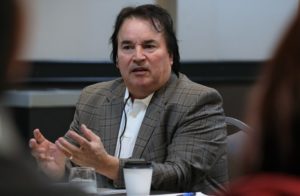Opinion: Response to Hayden King’s article on the Anishinabek Nation Governance Agreement vote

Hayden King’s article, “The Rise of the Anishinabek Nation: Self-Government for the Status Quo”, which was posted on the Yellowhead Institute’s website, demonstrates a misunderstanding of the purpose of Anishinabek Nation Governance Agreement (“Agreement”).
First, for far too many years, Anishinabek member First Nations have been challenged by the presence of unacceptable socio-economic conditions that all too often characterize communities and their citizens. When Anishinabek Nation Chiefs-in-Assembly mandated the negotiations to start the work on the Anishinabek Nation Governance Agreement over 20 years ago, they were concerned about how their communities continue to experience high levels of unemployment, poor health with far too many of our people suffering disproportionately from illnesses like diabetes, cancer and heart disease. In addition, First Nations continue to have housing shortages with a lack of proper public works infrastructures to support the need for more housing. Anishinaabe students continue to lag behind their non-Indigenous counterparts in provincial school systems and our language use is rapidly disappearing.
Anishinabek Nation leaders could have done nothing and let these unacceptable conditions continue; these conditions are not correcting themselves by continuing to govern ourselves in the way we do now with other governments determining our fate. Instead, Anishinabek Nation Chiefs-in-Assembly made a decision with the best interest of Anishinaabe people in mind to look at alternate ways of governing ourselves with less reliance on other government’s laws and exercise our inherent right to govern ourselves. This Anishinabek Nation Governance Agreement is based on the recognition that the inherent right of self-government is an existing aboriginal right within the meaning of section 35 of the Constitution Act, 1982, without the Parties taking any position with respect to how an inherent right of self-government may be ultimately defined at law. This is set out very clearly in the Agreement.
The law-making powers recognized under the Agreement have very few restrictions on how the resulting laws will look once they are enacted by our First Nation governments. In the case of the power to enact new election laws, there are no restrictions and communities can instead enact election laws that provide for longer terms of office. This gives Anishinabek Nation First Nations Councils more time to govern and help to address the socio-economic challenges facing their communities instead of being restricted to the two-year term of office available under the Indian Act. Just over half of the member Anishinabek First Nations continue to elect their leaders under the Indian Act and in fact, between April and November of this past year, 18 elections were held! This does not create stability and certainty in Anishinabek First Nations and the Agreement will give them the opportunity to develop their own ways of electing our leaders without prior review and approval by Canada. The people will quite rightly review and approve their new election laws instead.
The Agreement will also recognize their power to put in place mechanisms that help strengthen the use of our languages and to incorporate more of our cultural practices into the way they conduct council and community meetings. Meetings could start off with an offering of thanks to our Creator and use our medicines for help and guidance along the way. None of these powers currently exist in the Indian Act or related regulations. Instead, Anishinabek First Nations are exercising their inherent rights to govern themselves in the ways that work best for their communities.
The Agreement will also recognize the right to determine who our E’Dbendaagzijig or citizens will be and what rights, privileges and responsibilities come with that citizenship. It will not be a replacement for the Indian Act status provisions, but will set the stage and lay the groundwork for advocating for program and service funding based on citizenship lists, and not have funding flow into Anishinabek First Nations based on the narrow definitions of Indian status. This will help to ensure that for programs and services not recognized under this Agreement, will receive more fair and equitable funding for all.
Finally, Anishinabek First Nations will have the right to put in place their own operation and management laws and do away with federal requirements to post the honourariums, travel expenses and salaries received by leaders on their websites, unless this is what Anishinaabe citizens want. Most importantly, they will not have discretionary funding pulled if they do not want this reporting framework.
As for the funding available under the Agreements, the amounts available for performing the governance functions under the Agreement will increase by seven-fold. This will mean a significant investment into Anishinabek member First Nations. Furthermore, each community that ratifies the Agreement will receive $548,000 of additional funding to help with implementation of the activities and functions under the Agreement and there is no requirement to return any surplus funding to Canada. This Agreement will is better than what is found in the stringent 10-year funding agreements currently being made available.
In closing, this Agreement is a recognition of our existing aboriginal right to govern ourselves in our own way and help to address the historical unacceptable socio-economic conditions that all too often define First Nations. It has been developed over the last 20 plus years through numerous meetings with community members, leaders at regional forums, Chief and Council meetings, Grand Council Assemblies, working groups, committees, conferences and workshops and now, it is up to our citizens to have their say.
Respectfully,
Martin Bayer
Chief Negotiator for the Anishinabek Nation Governance Agreement
Relevant Links:
The Rise of the Anishinabek Nation: Self-Government for the Status Quo?
The Anishinabek Nation Governance Agreement: A Pre-Ratification Review

